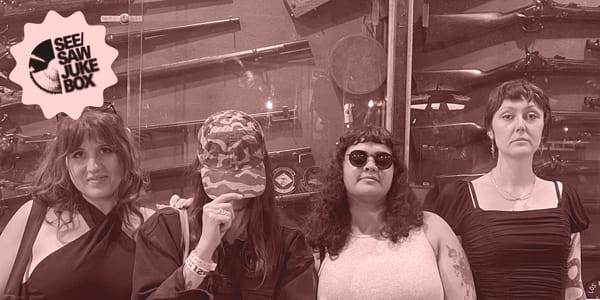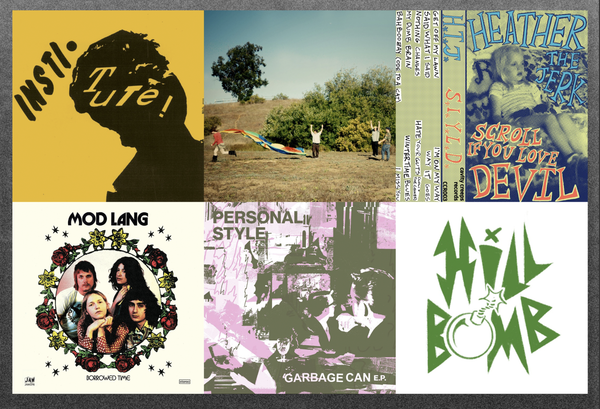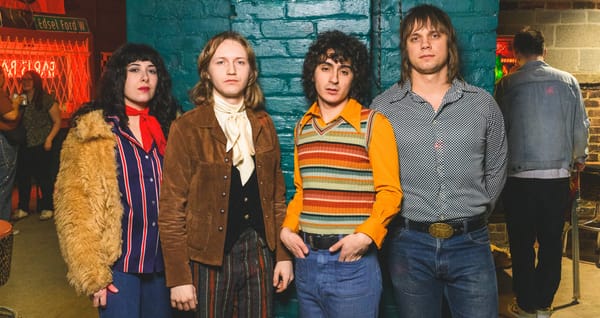fruit loOops’ no wave theatre of the absurd
The Cincinnati noise rock and performance art outfit, who once live-soundtracked a wrestling match at Santamania, chat at a hometown KFC/Taco Bell.
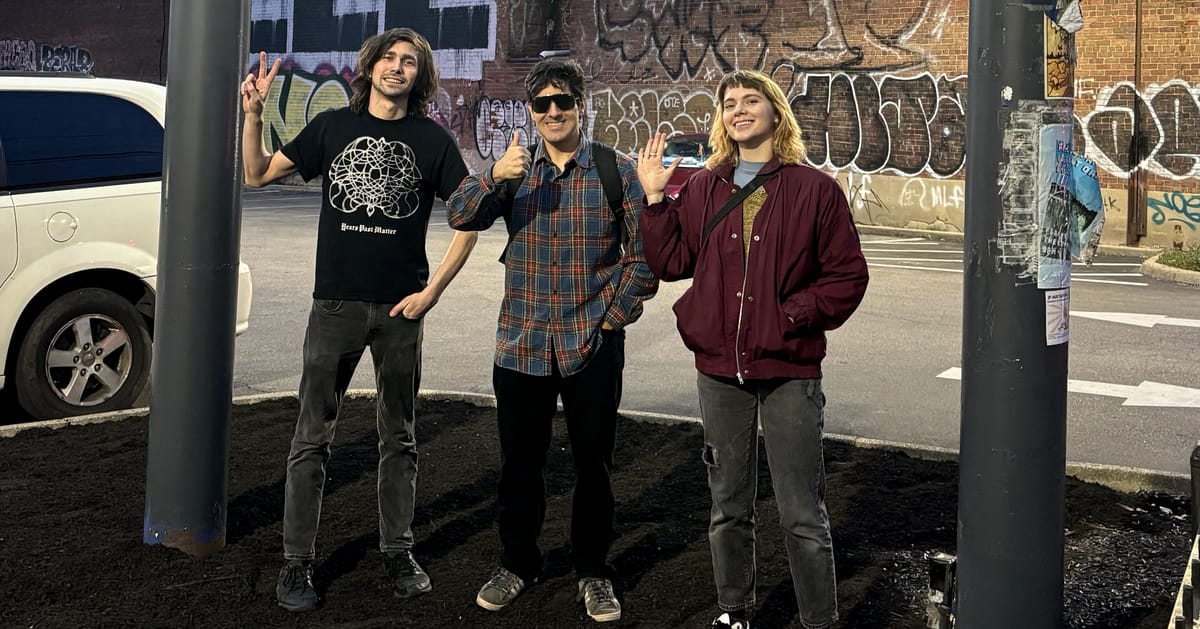
I’ve yet to attend a show that’s come close to matching the adrenaline rush I experienced during Fruit LoOops’ set at Santamania 2023. Dressed in matching referee’s stripes, the Cincinnati noise rock outfit intentionally faded into the background of their own performance, providing the live soundtrack to an unsanctioned, matless wrestling match staged on cold concrete. Static walls of dissonant synth program, nervy drum fills, and piercing vocals altered beyond recognition rained down with the same bone-rattling force of the steel chair on the heel’s back.
Though the band’s performances skew loud and hyper-stimulating, Fruit LoOops felt more at home amid the chaos than at its source: At times, the music felt so dense, it was downright ambient, congealing into a mass of pure, absurd noise. Bodies fractured folding tabletops and spilled into the surrounding crowd, who shrieked with joy and confusion. The lines between danger, discomfort, and ecstasy blurred.
Blending the scuzzy skronk of No Wave with the screwball electronica associated with labels like Hausu Mountain and Orange Milk Records (who will be releasing the band’s recently-announced Everything Is Clear To Me Now EP on June 6), Fruit LoOops’ music is aggressively playful, at times reminding me of Nintendo’s Splatoon scores, especially given frontwoman Jackie Switzer’s penchant for distorting her voice into something resembling whale sonar. This cartoonish quality lends itself to the band's theatrical performances, melding seamlessly with their surreal visuals and tongue-in-cheek gimmickry.
I met up with the trio in front of Northside’s iconic KFC/Taco Bell before their show at DSGN CLLCTV, during which they’d stage a game of Jeopardy! set in Hell, attempting to answer impossible questions to shave years off their infernal sentence. Looking back at some of the band’s favorite skits, we discussed their distinct sense of humor, affinity for Chicago’s freak scene, and recent embrace of club music.
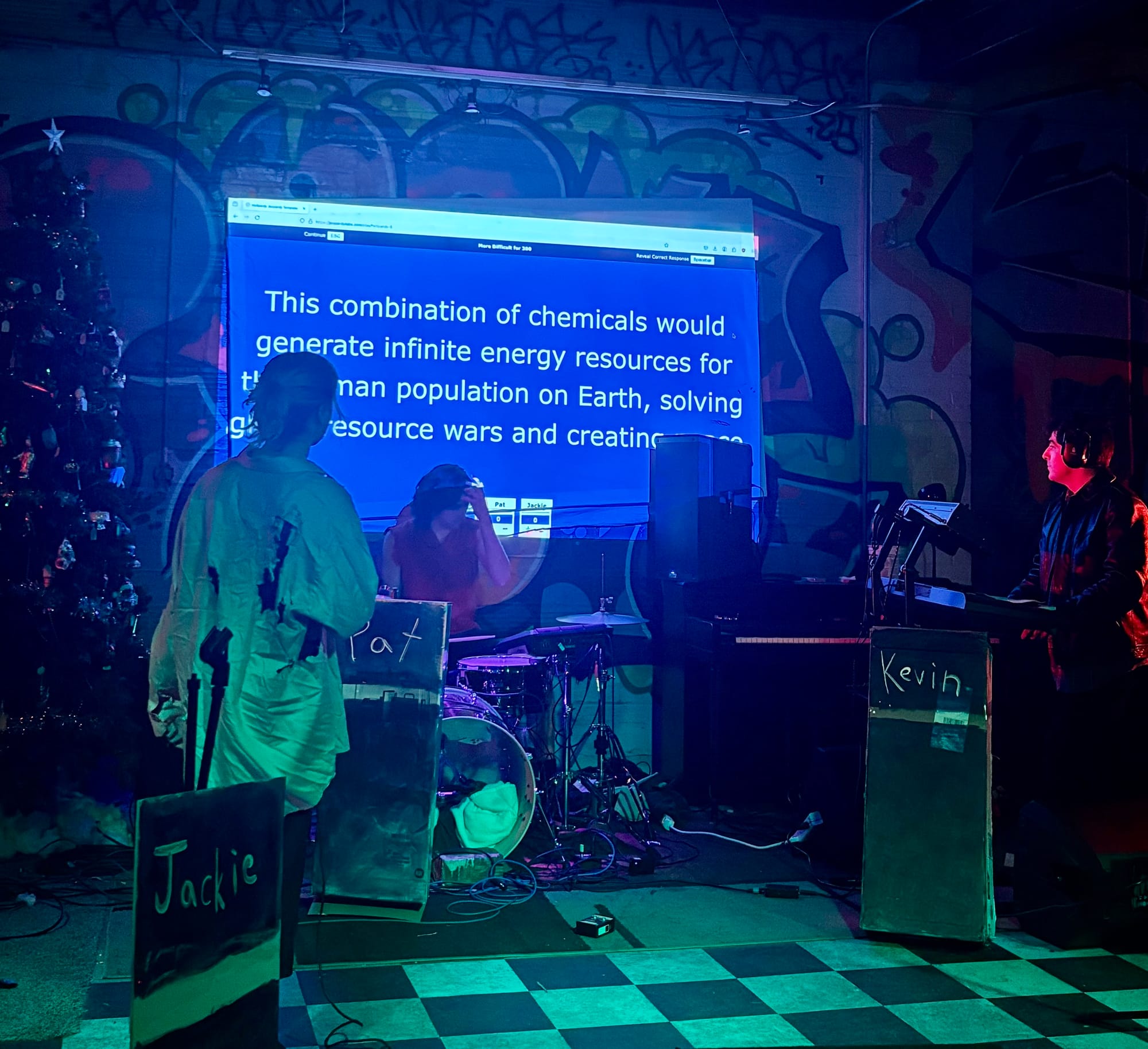
I wanted to ask about the live soundtrack to the wrestling match you did at Santamania 2023. Honestly, it was one of the coolest sets I've seen in person. How did that come together?
Patrick Apfelbeck: A lot of our stage sets have had a skit involved, and Jackie and Sam Jayne, who’s our performance artist guy, usually have a face and heel kind of dynamic going on. We’re already involved in a lot of kayfabe as it is, so it seemed like a natural fit. John Hays, who booked the festival, is pretty connected to the indie wrestling world. Overall, it was highly kinetic: a pretty overstimulating thing going on while we’re able to focus on the music, which is a lot of what we’re looking for. Skits that can be happening simultaneously with the songs, because a lot of the time, those elements have to happen separately so each can be heard.
Performance art has always been integral to your live sets. Where did the inspiration to do skits come from?
Jackie Switzer: It’s always kind of a joke. Something we think would be funny, like a cat stuck in a tree, but it’s actually a guy dressed as a cat climbing on a life-sized prop tree. A lot of times, the comedy’s in the size of things or the flatness of the joke.
Patrick Apfelbeck: The music can be pretty dissonant, so it’s a good bridge to connect to an audience. At lot of the noise shows in circles we’ve been in could be dour and self-serious. We wanted to lighten the mood while still playing intense stuff.
Jackie Switzer: It also changes a lot of what we can play. We did a Beatles set where we took their lyrics but wrote our own songs to them. It’s a good creative exercise.
What’s your favorite skit that you’ve done?
Patrick Apfelbeck: Wrestling was up there for me. We did a part two at a meat raffle Binski’s Bar where we were in the ring, but then Sam was running around in the crowd selling human organs out of a shopping cart.
Jackie Switzer: It’s also fun when they can go stupid big. There was one for the Northside Rock N’ Roll Carnival where Aaron, who organized it was like, ‘Hey, I have some fire dancers, want to use them?’ So we came up with the idea of a 50-year-old’s midlife crisis where a man shows up to his son’s birthday with a new wife from Las Vegas and he’s like, “look what I did for you!” He’s bringing out the dancers, cooking rare meat, and he rides around in a cardboard car.
You’ve put out your past two releases on Torn Light. What’s it like working with (shop/label owner) Alex York?
Jackie Switzer: He’s super enthusiastic about us. It’s really rewarding working with someone who also helps book shows and tours when he can. And he really enjoys the music.
Kevin Hall: It’s really important to have some sort of center where fringe music is supported when there’s not much backing or capital behind it. For a long time, that seemed to be lacking in Cincinnati, but over time the freak scene here’s gotten bigger.
You’ve been playing out in Chicago a lot lately, too.
Patrick Apfelbeck: There’s a lot of people making really weird, dissonant, aggressive music out there. It’s been a really supportive scene to us. A lot of people I’ve looked up to for a while are out there, like Fire-Toolz and The Flying Luttenbachers, and they’ve been really enthusiastic about us. It’s been cool to play with them and get their support.
Jackie Switzer: It’s been nice to build bridges, too. We did a show with RXM Reality, and he produced our upcoming EP. Then, Angel Marcloid from Fire-Toolz mastered it. Making connections in real life made everything so easy.
There’s a lot of dissonance and chaos in your music. To what extent is it composed or improvised?
Patrick Apfelbeck: It’s 95% hyper-composed. There’s some improvisation on the front end, while we’re still trying to find the optimal way to perform a song, and it might get a little more improvisatory as we get bored of it. But it’s a lot more composed than it might initially seem. The more these songs get played, especially in terms of drumming, you find the best way for the songs to work and for parts to get built up.
Kevin Hall: Even with the improvisational elements, there’s already so much of what’s referred to as avant-garde music that’s already so codified. There are all these tropes that may seem like random patterns, but if if you’ve listened to, like, free jazz from the ’70s, you’ve heard them a million times already. So in a way, even that stuff can be “composed” in a sense.
Patrick Apfelbeck: Especially in the way we’ve been writing lately. In the past, we’ve written individual sections and stapled them together. More recently, though, Kevin and I are jamming on these longer dance pieces that are 10-15 minute iterations of a few ideas permutated in different ways. You do it again and again until you find the optimal route. The writing process itself can be improvisatory, but then it gets whittled down to the best composition.
Lyrically, where are you coming from?
Jackie Switzer: I don’t know, I think it’s more of the sound of a word that I’m focused on. On earlier recordings, you can’t really tell what I’m saying, and that makes me comfortable. Because if I’m saying my actual feelings, like some lyricists do, I feel like it's too exposed. So now I’m trying to become more confident in using words and thinking very carefully about how they flow.
Speaking of the transitions between records, how do you feel like you evolved between your debut full-length album, Last Chance at the Pharmacy, and the follow-up LP, You’re Somebody’s World?
Patrick Apfelbeck: I think Pharmacy was definitely focused on chaotic energy. The one after that, Somebody’s World, is a little more melody-forward. But on this new EP that’s coming out in a couple months, the wall of sound has kind of gone away. It's trying to be a lot clearer. I was trying to make fucked up, deranged club music, and part of that does involve opening up the sound, letting things breathe a little more, rather than it being a shred fest.
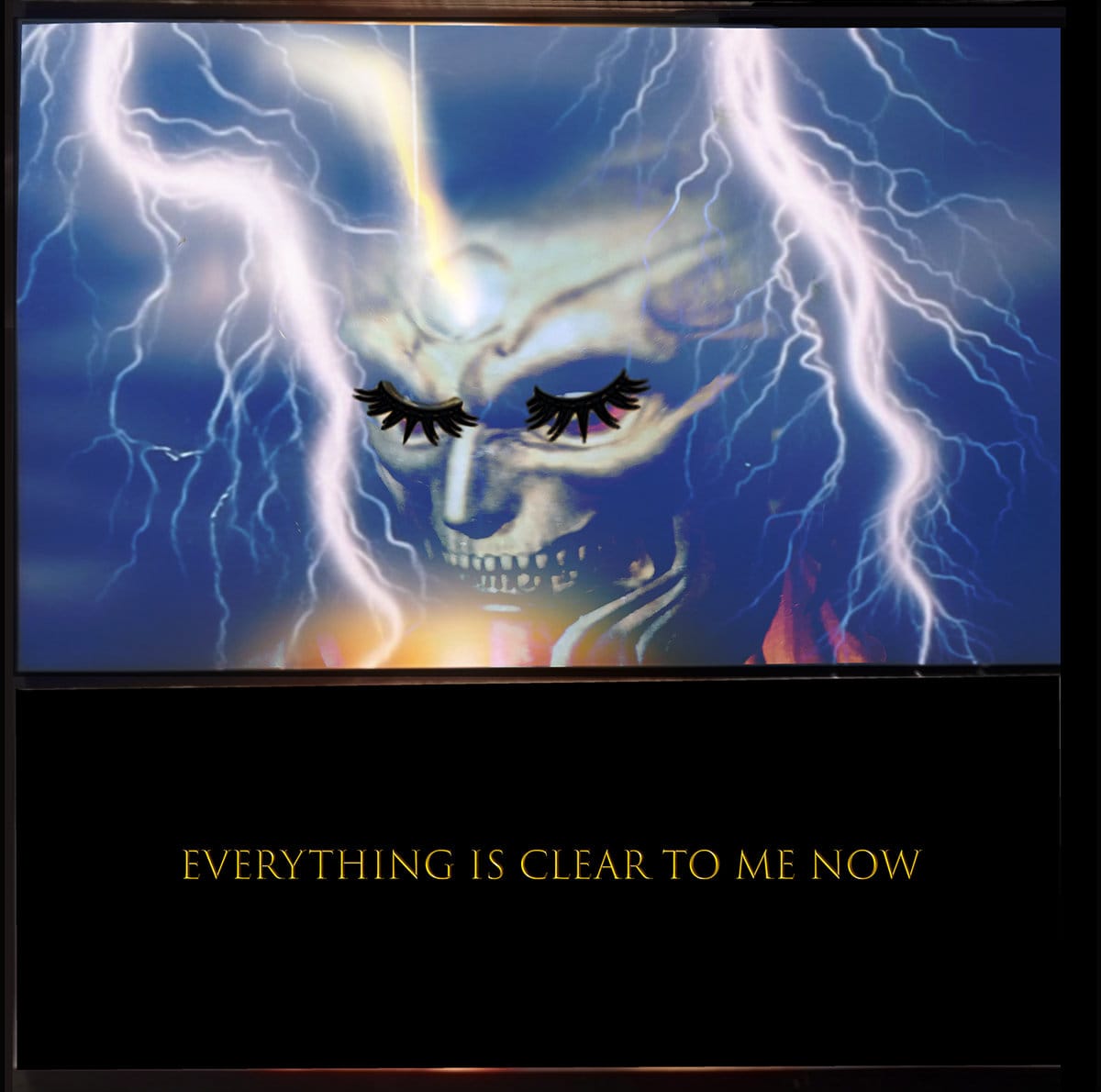
Are you playing any of that record tonight?
Patrick Apfelbeck: Yeah, it’s basically a bridge to where we’re trying to go now. We’re basically playing everything from that EP tonight, along with some newer stuff we’re writing. Anything we play tonight is unreleased.
Kevin Hall: We’re always behind.
How did you all meet?
Jackie Switzer: I met Patrick when someone from the original lineup was doing a Talking Heads cover set, and I was like “Woah, this is really cool.”
Patrick Apfelbeck: And the band that played that show was just the original lineup without Jackie. That was our original synth player and our bass player. And then Jackie had a dream about playing a contact mic attached to fruit in a blender live at The Comet, and she posted about it in this Facebook dream journal collective group. Me and the other people in that band just reached out and were like, “Oh, this sounds pretty dope. Let’s like, try and do it for real.” Since that first set already had a skit-slash-gimmick attached to it, it was an easy thing to keep following up on and iterating on. I know Kevin from playing in another group, Fourth Wife
Jackie Switzer: And Sam and I were random roommates in college. He was an art major and saw us live, and was like “I love this. I want to do this with you somehow.” He worked his way into being an extra, and then started making props and just kept going.
What are the main influences on the upcoming EP?
Kevin Hall: I would say outsider techno and electronic music.
Patrick Apfelbeck: Container, a little bit.
Jackie Switzer: I listen to a lot of Bjork, but I don’t know if that really makes it into the music.
Patrick Apfelbeck: The whole last year and a half, I’ve been really DJ Sabrina the Teenage DJ obsessed. The music doesn’t really sound like that, but the way she thinks about her songs is a mindset I’ve been trying to put forward, rhythmically, in our new material.


